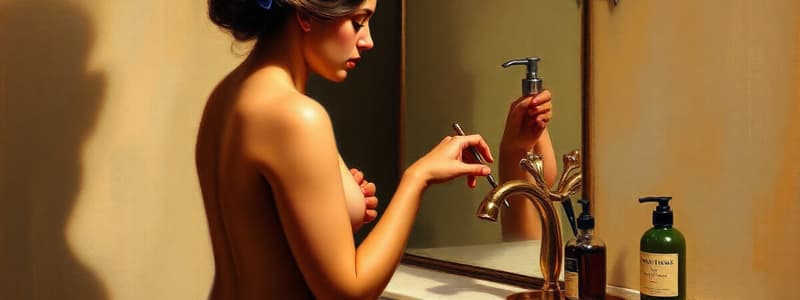Podcast
Questions and Answers
What primary role do eccrine glands serve?
What primary role do eccrine glands serve?
- They are involved in hair growth during puberty.
- They produce body odor when sweat mixes with bacteria.
- They contribute to the oily texture of the skin.
- They are responsible for cooling the body through sweat. (correct)
Which of the following practices is NOT recommended for managing body odor?
Which of the following practices is NOT recommended for managing body odor?
- Bathe and wash hair frequently.
- Changing clothes after physical activity.
- Using deodorant on clean skin.
- Avoiding washing the body to prevent skin irritation. (correct)
What is the primary function of antiperspirants?
What is the primary function of antiperspirants?
- To eliminate bacteria on the skin.
- To moisturize the skin after washing.
- To block sweat pores and reduce wetness. (correct)
- To mask the smell of body odor.
How often should you wash your face according to the recommendations?
How often should you wash your face according to the recommendations?
Which statement about hair care is incorrect?
Which statement about hair care is incorrect?
What is the impact of poor hair care practices?
What is the impact of poor hair care practices?
Why is it important to change your pillowcase and sheets regularly?
Why is it important to change your pillowcase and sheets regularly?
What is the correct technique for brushing teeth to ensure proper dental care?
What is the correct technique for brushing teeth to ensure proper dental care?
Flashcards
Apocrine Glands
Apocrine Glands
Located under arms, in the genital area, and on the scalp, these glands become active during puberty and produce sweat that mixes with bacteria, causing body odor.
Body Odor
Body Odor
This occurs when sweat mixes with bacteria on the skin. It's a natural side effect of having apocrine glands.
Sweat's Cooling Function
Sweat's Cooling Function
This happens when your body needs to cool down, protecting you from overheating.
Body Care for Reducing B.O.
Body Care for Reducing B.O.
Signup and view all the flashcards
Antiperspirant
Antiperspirant
Signup and view all the flashcards
Deodorant
Deodorant
Signup and view all the flashcards
Dental Care
Dental Care
Signup and view all the flashcards
Shampoos and Conditioners
Shampoos and Conditioners
Signup and view all the flashcards
Study Notes
Why Sweat?
- Sweat is a normal and unavoidable bodily function, essential for cooling the body.
- Eccrine glands produce odorless sweat.
- Apocrine glands produce sweat that mixes with bacteria, causing body odor (B.O).
- Apocrine glands develop during puberty.
- Apocrine glands are located under arms, in the genital area, and on the scalp.
Body Care
- Bathe regularly to remove dirt and oil.
- Change underwear and clothes frequently to avoid sweat buildup.
- Use deodorant or antiperspirant to mask or minimize body odor.
- Deodorant covers up body odor.
- Antiperspirant reduces sweating.
Daily Facial Care
- Wash your face twice daily with a gentle soap or cleanser suitable for your skin type.
Healthy Hair
- Dirt, dust, pollution, and sweat can lead to dull or limp hair.
- Over-styling can damage hair.
- Choose hair products suitable for your hair type.
Hair Care
- Use shampoos and conditioners based on your hair type.
- Shampoo removes dirt, oil, and product buildup from hair.
- Conditioner detangles and moisturizes hair.
- Rinse hair products thoroughly to prevent product buildup and dandruff.
Body Hair
- Body hair growth increases during puberty.
- Removing body hair is a personal choice.
Dental Care
- Brush teeth twice daily for 2 minutes with toothpaste.
- Use a soft bristled toothbrush to protect gums.
- Floss
Don't Get Sick
- Rinse your mouth with water after eating/snacking if you don't have a toothbrush.
- Visit the dentist regularly for check-ups.
- Wash your hands thoroughly.
- Cover your coughs and sneezes with your elbow or a tissue.
- Stay home if you are sick.
Studying That Suits You
Use AI to generate personalized quizzes and flashcards to suit your learning preferences.




